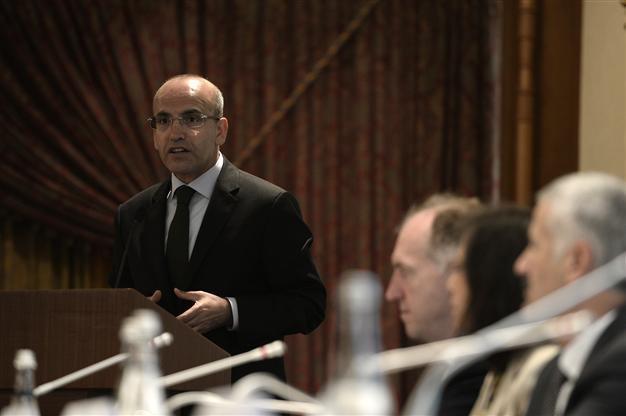Turkish ministers sing differing tunes over interest rate policy
ANKARA/ISTANBUL

Turkish Finance Minister Mehmet Şimşek defended May 28 the central bank's policies. AA Photo
Prime Minister Recep Tayyip Erdoğan’s sharp criticism of the Central Bank over its interest rate policy has exposed a split among Turkey’s top economic managers, who are divided over the limits to interference in the bank’s independence.
Erdogan said earlier this week that the Central Bank’s surprise interest rate cut last week, which followed a huge rate hike in late January, was insufficient.
While Economy Minister Nihat Zeybekçi joined Erdoğan in slamming the lender for not reducing interest rates and for jeopardizing investment, Deputy Prime Minister Ali Babacan and Finance Minister Mehmet Şimşek noted the importance of the bank’s autonomy and the need to protect it from political pressure.
“The Central Bank’s credibility and independence is very important for the future of the Turkish economy,” Şimşek said at the Turkish-Arab Economic Forum in Istanbul.
“I believe the Central Bank did and will do the best for our country’s interests,” he said. “The Central Bank’s independence is one of the biggest gains of the last decade.”
When asked about the issue, Şimşek said he agreed with Babacan, who had laid emphasis on the significance of protecting the institution from assaults on its autonomy.
“Our institutions should continue working without giving up their main principles and compromising their assigned positions,” Babacan said May 27.
“Turkey’s future is bright as long as we, as the government and the Parliament, keep implementing the written rules. But if the fundamental principles begin to be compromised and if the promised policies are abandoned, you should be scared too,” he said.
Praising the government for creating “today’s trust” by “keeping its promises” over the past 11 years, Babacan said it should maintain the course to sustain such trust.
Şimsek also defended Central Bank efforts to tame rising prices while noting that inflation was likely to peak this month, reinforcing expectations that the bank could again lower rates.
Speaking separately yesterday, Zeybekçi dismissed suggestions that criticizing the bank’s policies would jeopardize its autonomy and said Turkish interest rates were too high, contributing to inflation and undermining growth and employment.
“I don’t think we are putting pressure on the Central Bank by expressing our worries here,” he said.
“We think interest rates are high, higher than the levels they should be at,” Zeybekçi told reporters at an industry conference in Istanbul.
“Markets are pushing market interest rates down ... The Central Bank should lead the market trend, not follow the market from behind,” Zeybekçi said, arguing that high borrowing costs were contributing to rising inflation.
Erdoğan and Zeybekçi’s view that high interest rates lead to inflation are contrary to the opinion of most economists, who argue that Turkey’s stubborn inflation is largely imported, driven by a weak Turkish Lira and a heavy trade deficit, according to a Reuters report.
“Zeybekçi does himself no favors with investors by again backing his prime minister by arguing that high interest rates contribute to inflation,” said Timothy Ash, head of emerging markets research at Standard Bank in London.
“The AK Party [Justice and Development Party] government has something of a bee in their bonnets about this ... Most economists, and central bankers, would argue that the causality is the other way around, but it does show the dominant thinking within the AKP,” Ash said.
“The question ... is whether commentary from Erdoğan and some of his ministers is just meant for domestic consumption ... and driven by the electoral calendar, or the sub plot is to actually pressurize the Central Bank to cut rates,” Ash said.
